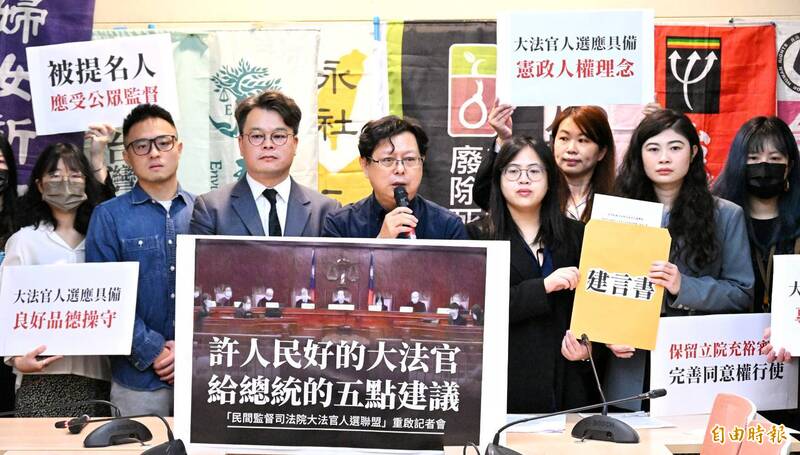The Civilian Oversight Judiciary Candidates Alliance held a press conference on "Five Suggestions for the President from the Justice of Xu People's Goodwill".
(Photographed by reporter Fang Bin)
[Reporter Lv Yixuan/Taipei Report] 16 militia groups, including the Judicial Reform Commission, formed the "National Supervisory Judicial Yuan Justice Candidate Alliance", which officially restarted today.
The alliance put forward five suggestions to the Presidential Palace, including public opinion consultation, good conduct, gender ratio should be emphasized in composition, nominees should be subject to public supervision, and sufficient deliberation period should be reserved, and stated that they would form an "evaluation committee" to evaluate The suitability of candidates nominated for justice.
Four justices in the Judicial Yuan will expire at the end of September. President Tsai Ing-wen approved the establishment of the "112-Year Judicial Yuan Justice Nomination Review Group" and hired Vice President Lai Qingde as the convener to assist the president in nominating candidates.
After the group held its first meeting last week, it will openly accept candidates recommended or self-recommended by all walks of life, and will be appointed after consultation with the Legislative Yuan during this session.
Please read on...
The "National Coalition to Supervise Judiciary Candidates" held a press conference in the Legislative Yuan today.
Sun Youlian, convener of the alliance and secretary-general of the Taiwan Labor Front, said that as the guardian of the constitution, the justices should not be chosen carelessly.
However, with regard to the nomination and approval of justices, our country has not yet clearly defined the content in law. In order to make the nomination process more complete and fully communicate with civil society, the alliance officially restarted today and submitted a proposal to the presidential palace.
After the president announces the nominees, the alliance will also form an impartial and professional "Judge Nominee Appraisal Committee" to evaluate and publish the result report.
The 5 points of advice include first, before formally nominating, the president should first announce the nominees and their reasons, and solicit public opinions; the alliance suggested that before formally nominating, the president should first announce the nominees and their reasons, and solicit public opinions.
Second, candidates for justices should have good ethics, constitutionalism and human rights concepts, and professional education; the alliance emphasizes that the nomination of justices should be fair and objective, and should not be based on ethnicity, geography, origin or ideology.
Third, the composition of the justices should pay attention to diversity and gender ratio; the alliance suggested that at least two women should be nominated this time in order to meet the requirements of the Convention on the Elimination of All Forms of Discrimination against Women.
At the same time, regardless of the gender of the nominee, they must have a good sense of gender equality.
In addition, the alliance also called on the president to pay attention to the diversity of justices and avoid excessive concentration in a single academic institution.
Fourth, the nominee’s willingness to accept public scrutiny should be considered when nominating. The alliance mentioned that in 2019, nominees for justices “collectively refused to respond” to private questionnaires, and called on the president to consider the nominee when nominating Willingness and attitude to accept public scrutiny.
Fifth, a sufficient deliberation period for the Legislative Yuan should be preserved. The alliance calls for at least two months of deliberation time to avoid hasty and sloppy procedures.
Sun Youlian also added that regarding the nomination of justices, the alliance openly recruits questions from all walks of life to ask whether the justices are suitable for the post.
Due to the wide range of interpretations of the Constitution, it is hoped that through the questions provided by all walks of life, the nominees for justices will be prompted to respond to issues such as human rights, gender, environment, ethnic groups, and labor.
Civil groups participating in the monitoring include Human Rights Covenant Implementation Supervision Alliance, ROC Alliance for Mental and Disabilities, Citizens Supervision Congress Alliance, Civil Constitutional Promotion Alliance, Taipei Bar Association, Taiwan Human Rights Promotion Association, Taiwan Yongshe, Taiwan Criminal Defense Lawyers Association, Taiwan Law Society, Taiwan Unjust Prison Rehabilitation Association, Taiwan Jury Association, Taiwan Labor Front Association, Taiwan Abolition of the Death Penalty Promotion Alliance, Civil Judicial Reform Foundation, Women's New Knowledge Foundation, Environmental Lawyers Association, etc., are continuing to invite.
